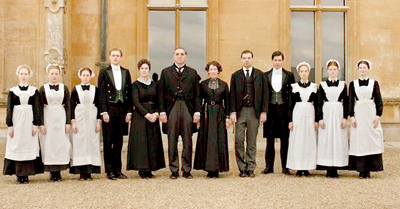Sunday Times 2
Big-money butlers
Butlers may seem like a relic of another era, but in some other countries, particularly emerging economies, they are in huge demand – and their employers can often afford to pay handsomely for the privilege. If PG Wodehouse’s unflappable valet Jeeves had been called upon to work in the Arabian peninsula, you can be sure he would have been perfectly at home – Mayfair, Abu Dhabi… it’s all the same if you’re a professional with a job to do, a rigid dress code to uphold, and a gentleman to protect from overbearing aunts.

The popularity of British period drama Downton Abbey may also have contributed to the huge demand for trained help (AFP)
But increasingly British-trained household staff, particularly butlers, are being hired to work not in London but for super-rich clients abroad – and in Dubai, right now, they are all the rage. They may live downstairs rather than upstairs, but some are on stratospheric salaries.
Sara Vestin Rahmani, director and founder of London’s Bespoke Bureau British Butler and Housekeeper Academy, placed one newly-trained butler in the United Arab Emirates this year on an annual salary of 582,000 Emirati Dirhams – the equivalent of £100,000 or $158,000.
Dillon, 37, who swapped the military to train to be a butler three years ago, hasn’t looked back since he took up the residence on the exclusive artificial archipelago Palm Jumeirah to work for an Emirati family business in 2011.
“I went in at entry level at £35,000 ($55,000) plus all expenses paid. I now earn £70,000 but I work very hard,” he says.
“I travel bi-weekly and I am expected to be on call 24/7, caring for my principal’s personal things like clothes, travel bookings, reservations and shopping. I also have to make sure he’s always looking good and that he stays hydrated in the heat.”
The perks don’t stop at a tax-free salary in the sunshine. Dillon gets August and September off to see his family in the UK, private jet travel as standard, a luxury apartment – and bonuses if he’s lucky, which, he admits, he usually is.
But then again, he has to deal with off-the-wall requests that you don’t come across in a standard nine-to-five office job.
“The craziest thing I’ve had to do was to find a temporary nanny for two meerkat babies that the family had rescued,” he says. “We placed them in a good zoo eventually after shipping them to Europe.”
Adam is another Dubai-based butler, who responds to my email somewhere in Europe aboard his Emirati family’s 65-foot yacht. “Right now, we only have celebrities and super VIPs on the boat and they have high demands and odd requests,” he says.
“I was asked to head up to the mountains with the private jet captain last week to purchase some speciality coffee from Switzerland.” “[In Dubai] we once had to postpone a dinner party until specific glass plates had arrived from Europe because a VIP guest didn’t want to eat her food off porcelain.”
Adam loves his job – and his cool £90,000 (plus bonuses) salary – but he also reveals that this lifestyle comes at a price.
“I have a family but only see them on my downtime. The job suits singles better as you work hard and have to be totally flexible for your boss.”
But why is it that British-trained staff are particularly sought-after? “Britain has a history of the class system, household staff, etiquette, great traditions,” suggests Vestin Rahmani. ”The new rich – and the rest of the world – are fascinated by the protocol that comes with these specific British traditions.
“The ‘new money’ clients want status, control of their households and to ‘be seen’ as rich and important so they show off with these exceptional British workers.” The popularity of British period drama Downton Abbey may also have contributed to the buzz, says William Hanson, who has trained butlers for private families all over the world and leads etiquette sessions at The English Manner, a British protocol-training firm, which recently opened a branch in Dubai.
The melting pot of cultures and nationalities in the city certainly helps, he says, as the different communities are open to learning from one another. When it comes to training household staff, of any nationality, the British style is particularly valued.
“Dubai very much ‘gets’ the need for this type of training,” Hanson says. “The new British general public just doesn’t see the need. They are quite arrogant in that regard, thinking they are above it all because we invented it. Yet around the world, Old England is still perceived as the hallmark of standards and good taste – and rightly so!”
He points out, however, that the role of the butler has changed enormously since the days of Oscar Wilde, P G Wodehouse or Downton. “Now the job’s not just about decanting the wine for dinner and cleaning the silver,” he says.
“It’s about running schedules, organising and motivating a team, managing multiple properties and caring for truly extraordinary precious possessions,” he says. It’s more demanding and interesting and can take people all around the world.”
A butler’s top etiquette tips
- Never answer a mobile during a meal or a business meeting: concentrate on the person, not the gadget
- Always hold a door open for someone regardless of who they are or what gender
- Men should never drink beer out of a bottle. Babies drink from bottles – gentlemen drink from glasses
- Respect the country you’re in (when in Rome and all that)
- Learn the 16 different types of spoons used in Western dining – and never mistake a sugar spoon for a teaspoon
(Courtesy BBC)
comments powered by Disqus
